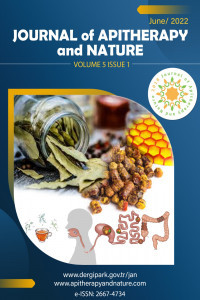Anticancer Properties of Aqueous and Nonaqueous Propolis Extracts
Anticancer Properties of Aqueous and Nonaqueous Propolis Extracts
Propolis, Aqueous extract, Anticancer Properties,
___
- .
- Yayın Aralığı: Yılda 2 Sayı
- Başlangıç: 2018
- Yayıncı: Oktay YILDIZ
Chemical Profile of Greek Arbutus unedo Honey – Biological Properties
αrgyrο ANDREOU, Ioanna CHINOU, Konstantia GRAIKOU
İsamara Julia CAMURI, Adriano Batista COSTA, Wallance Moreira PAZIN, Amando Siuiti ITO
Antituberculosis Activity of Propolis
Jarosław WIDELSKI, Joanna GOLUS, Piotr OKIŃCZYC, Rafał SAWICKI, Grażyna GINALSKA, Tomasz MROCZEK, Zuriyadda SAKIPOVA, İoanna CHINOU, Krystyna SKALICKA-WOŹNIAK
Carmen Violeta POPESCU, Hazem ABBAS, Stefan MANEA, Lili IVOPOL, Alina DUNE, Candice POPINIUC, Dumitru LUPULEASA
Anticancer Properties of Aqueous and Nonaqueous Propolis Extracts
Zbigniev BALION, Aistė JEKABSONE, Kristina RAMANAUSKIENE, Daiva MAJIENĖ
İvan MISKULIN, İvana KLARIC, Matija DOMACINOVIC, Berislav PRAKATUR, Mirela PAVIC, Mario RONTA, Maja MISKULIN
Some Apitherapeutic Properties of Chestnut Propolis
Sevgi KOLAYLI, Saliha EKSI, Zihni YAZICI, Oktay YILDIZ, Hüseyin SAHIN, Zehra CAN, Sengül KARAOGLU
Shankar KATEKHAYE, Hugo FEARNLEY, James FEARNLEY, Anant PARADKAR
Portuguese Propolis: A Source of Valuable Bioactivities
A CUNHA, H ALVES, C ARAÚJO, L BARROSO, M CRUZ, As FREİTAS, Aj GOMES, R GONÇALVES, R MARQUES, B MOREİRA, C PASSÃO, M PEİXOTO, H PEREİRA, R SİLVA-CARVALHO, İ VALENÇA, Am FERREİRA, F BALTAZAR, F PİNTO-RİBEİRO, S CARDOSO, R OLİVEİRA, C ALMEİDA-AGUİAR
